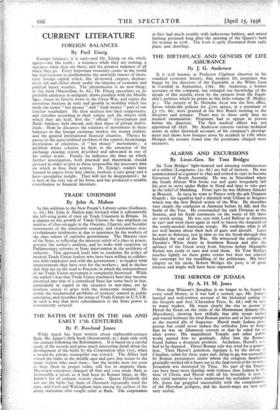CURRENT LITERATURE
FOREIGN BALANCES By Paul Einzig
Foreign balances, it is said—and Dr. Einzig on the whole agrees—are like teeth ; a nuisance while they are coming, a nuisance while they are there, and the greatest nuisance of all when they go. Every important monetary centre in the world has had occasion to anathematise the unwieldy masses of short- term foreign capital which, like ill-stowed cargoes, destruc- tively jolt and slither abottt under the impulse of economic and political heavy weather. The phenomenon is no new thing; in this book (Macmillan, 8s. 6d.) Dr. Einzig speculates on its probable existence in antiquity, draws parallels with the Middle Ages, traces its history down to the Great War, and marks the enormous increase in scale and growth in mobility which has made the terms " hot money " and " funk money " part of our familiar vocabulary. He then analyses into their components, and classifies according to their nature and the objects with which they are held, first the " official " (Government and Bank) balances held abroad, and then those of-private indivi- duals. Next he discusses the relations of movements in these balances to the foreign exchange market, the money market, and the general international financial situation. Thence he passes to the quasi-political problem of the control, by exchange restrictions or otherwise, of " hot money " movements ; a problem whose solution he finds in the extension of the exchange clearing system described and advocated in one of his earlier works. Finally, he indicates the lines on which further investigation, both practical and theoretical, should proceed in order to give to those responsible the necessary data on which to base their actions. Dr. Einzig's readers have learned to expect from him clarity, method, a sure grasp and a keen speculative insight. They will not be disappointed ; he is here at the very top of his form, and has produced a notable contribution to financial literature.






































 Previous page
Previous page